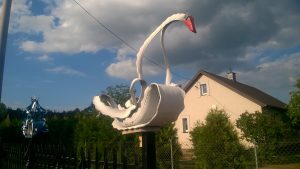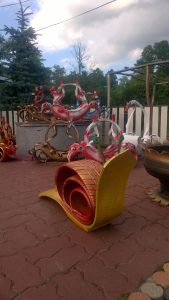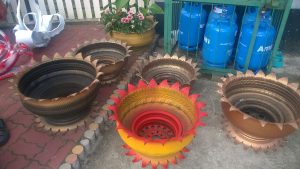It seems like trying to live in a sustainable way in a mobile community we constantly find ourselves reusing other people’s trash. We can’t grow our own but we try to keep our carbon footprint as low as possible, finding alternatives to buying new.
Obviously, Western European trash is very different from the trash we see in the east of the continent. Last year in Scandinavia we were able to source nearly all of our food (and even clothes and shoes!) from supermarket food skips without much effort. We had a dumpster diving team on the rota every day and people searched for food in random supermarkets on the way.
In Poland a lot of food is being thrown into unlocked dumpsters of a ubiquitous supermarket chain with a ladybird logo, which name I won’t even mention they are so horrible to their workers, they’ve had some big lawsuits filed against them. Apparently shops with a very generic name “Delikatesy” also make for an appetizing menu for a dumpster diver. In Warsaw there is even a facebook group gathering info on good dumpsters and our hosts at ROD were able to provide us with a list of bins where food is plentiful. Unfortunately, organising ourselves to go dumpster diving when there were so many other things to pull together was hard at first.
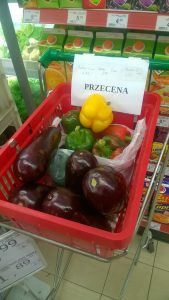
Smaller shops often reduce the price of slightly wilted vegetables, fruit and of perishable products before they expire so often they don’t produce as much waste and opening their bin isn’t such a jaw dropping experience.
What will Belarusian dumpsters be like?
We have been doing our best to recycle packaging of our food which meant sometimes carrying cans and plastic on our bikes for long distances. In most villages in Eastern Poland it was hard to find recycling bins and not even bigger supermarket chains like Kaufland or a local one, Topaz had recycling facilities for customers. Often local councils have a scheme where households get colour-coded plastic bags and do their recycling at home which is then picked up once a week or a fortnight. Sometimes the residents who don’t recycle have to pay extra because it means they go over the limit with their non-segregated waste.
Packaging is a big deal when travelling. You often end up buying processed over-packaged food because it’s easy and you get hungry from all the cycling. Peanut butter + skipped bread and bananas are ideal but warm meals are nice too and beans for protein are important for muscle power and body mass. It’s hard to soak beans when you’re constantly moving! Ready beans come in tins. Scrap metal is a pretty big business, in Poland at least. From the men who walk the streets and backyards in search of aluminium cans and tins made of steel, then sell small quantities that fit in their hand pulled trailers dirt cheap to small scrapyards, all the way to big companies who trade waste internationally, scrap metal travels from hand to hand from country to country and continent to continent.
There are no compost recycling facilities provided by the authorities, usually people do 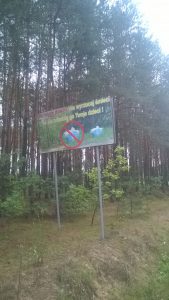 it off their own back if they have a garden or an allotment. On the road we have been using our shit shovel to bury organic waste.
it off their own back if they have a garden or an allotment. On the road we have been using our shit shovel to bury organic waste.
On road sides we have seen plenty of signs appealing to drivers to refrain from litter dropping. Like this one that reads «Trees grow slowly. Don’t litter your forest or your children won’t see it». It’s not only just bad translation, it sounds clumsy in Polish too.
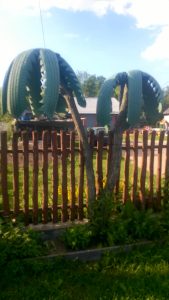
Somewhere between Sadowne and Treblinka very original car tyre art caught our eye. The artist himself seeing our interest invited us to see his extensive collection of plant pots, snails, swans and even a palm tree all made of old tyres. It would be great to post a link to his website here so that you could get inspired or even get some presents for your friends and family but like so many good things, he doesn’t exist online.
We have also built a compost toilet entirely made of reclaimed wood and glass. A separate post about it coming soon!
